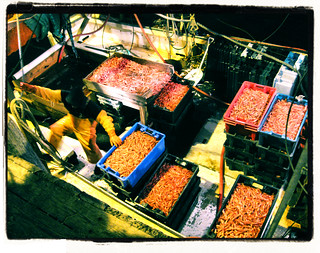 From moose to puffins to lobsters, global warming is devastating Maine's wildlife, seafood and economy. Why is it so hard for media to say so?
From moose to puffins to lobsters, global warming is devastating Maine's wildlife, seafood and economy. Why is it so hard for media to say so?The latest bad news is hitting Maine's shrimp fishermen:
Federal regulators shut down the commercial fishing season for northern shrimp in the Gulf of Maine for a second straight year on Wednesday, citing concerns about the declining population and warmer ocean temperatures.The Associated Press blames "warmer ocean temperatures" but never directly references global warming, never mind connecting the dots to carbon pollution. It did the same thing last year. The Portland Press Herald repeatedly ignored the climate connection in its news coverage, but did editorialize on it.
The Atlantic States Marine Fisheries Commission's Northern Shrimp Section voted to cancel the upcoming season, a year after the section closed this year's season for the first time in more than 30 years. A technical committee that advises the section recommended extending the moratorium for another year.
The "depleted condition of the resource and poor prospects for the near future" warrant another closure, the committee reported, adding that "long term trends in environmental conditions" for the little pink shrimp are unfavorable. The amount of the shrimp's population that can be fished is at an all-time low, regulators said.
The connection to climate change is crystal clear. September ocean surface temperatures were 1.2 degrees F above the 20th century average, "the highest on record for September and also the highest on record for any month," according to NOAA's National Climatic Data Center.
Associated Press reporter Patrick Whittle clearly understands the connection between carbon pollution and warmer Gulf of Maine water because he's reported on it before. But global warming is most often treated as its own, separate story and not mentioned in news coverage of climate impacts. Also, I notice that the URL for that story hints his title once called the Gulf of Maine a poster child for global warming. That's since been softened to "Warming Gulf of Maine imperils lobster, fish catch" and the climate connection isn't made explicit until the story's 6th paragraph.
So why didn't the latest coverage of the shrimp shutdown mention global warming? The press release from the 15-state Atlantic States Marine Fisheries Commission didn't make any mention of climate change, and the AP didn't make the bridge for its readers. A similar story played out last year when the Massachusetts Port Authority issued a report on sea level rise - Massport wouldn't say climate change and reporters wouldn't connect the dots.
What that means is it's not just about the science. Media outlets are requiring a multi-phase scientific and political approval process:
- The scientific evidence must be iron-clad
- Scientists must be willing to face threats from Tea Partiers
- Regulators must be willing to put their jobs on the line in the face of politically-motivated attacks
The next time you see a poll on how many Americans accept climate science, imagine what the numbers would look like if the media actually connected the dots to climate change in every story like this.


